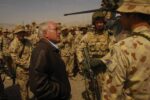What a difference a year makes in international diplomacy
A year ago, then-US President Donald Trump was obliged to abandon his plans for a G7 summit at the presidential retreat of Camp David outside Washington. Various excuses were advanced by participants, including the inadvisability of travelling across the world in the midst of a pandemic. But in reality few, if any, G7 leaders wanted to associate themselves with Trump in what was hoped would be the last days of an ill-starred presidency. A year later, these same leaders gathered at an English coastal retreat – in the shadow of a persistent COVID-19 pandemic – to celebrate the end of a disruptive chapter in diplomatic history. Relief was palpable in the interactions of representatives of the United States, United Kingdom, France, Germany, Japan, Italy and Canada. America was back, not in its “America First” guise, but as the proclaimed leader of the free world, to use an old-fashioned description. However, in the four years of the Trump presidency, during which Washington effectively abandoned its global leadership role in favour of an inward-looking posture defined by its embrace of an America First doctrine, the world had changed, and shifted dramatically. In 2016, the final year of the Obama administration, the G7 summit in Japan focused on the issue of climate in the wake of the Paris Agreement signed in April of that year. Its other priorities were disputes in the South China Sea and, interestingly enough, the need to strengthen a global response to pandemics in light of experiences with the Ebola virus in Africa. That global response has been found to be inadequate. This prompts the question: what notice did global health authorities, principally the World Health Organization, take of the G7’s 2016 communique? Five years later, the challenges identified in the 2016 document have been vastly magnified. This has been brought about by a combination of lack of […]










